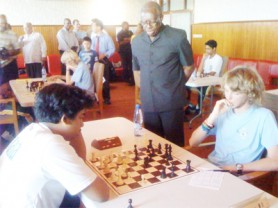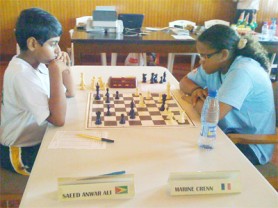Rivalries in sport are usually riveting; between individuals, and sometimes, between countries. In boxing, there was Muhammad Ali vs Joe Frazier, and for years in cricket, there was the West Indies vs Australia. For Guyana, I can think of no greater, and passionate rivalry, than Guyana vs Suriname in football.

But although there are no exchanges verbally, or physically, the heated rivalries in chess are comparable to other disciplines in sport. We feel the same contempt for our opponents, and in the words of Bobby Fischer, we “like to see ‘em squirm”. In a number of instances, players refuse to shake each other’s hands before play begins, prompting FIDE ( World Chess Federation ) to implement a new rule making it compulsory for players to shake hands before the start of a game in competition.

Alekhine vs Capablanca, Fischer vs Spassky, and Karpov vs Kasparov were some of the legendary rivalries in chess. As the saying goes, there was no love lost among these players when they competed for supremacy against each other. These were the titans of chess. Capablanca was so sure of himself that he said chess came as naturally as breathing to him.
His mind operated at a level of synthesis that took in everything over the board as naturally as breathing. From 1916 to 1924 he did not lose a single game. He was known, and feared, as the “Cuban Chess Machine”. No one could touch him.
In 1927, when Capablanca was at his peak, and considered invulnerable, he gave Dr Alexander Alekhine, a lawyer from Russia, a crack at his world championship title. And here Capablanca met his Waterloo. Suddenly, what should have been an effortless victory, turned out to be a murderously exhausting struggle featured by draw after draw. Capablanca found himself fighting for his life. Chess, it seemed, was not as easy as breathing any longer. He lost the title to Alekhine and was never granted a return match. In those days there was no governing body that could demand that the world champion defend his title. The champion picked his challenger. It was nine years after the 1927 match that the two rivals came face to face with each other in a tournament. Capablanca won.

In terms of the duration of games, and the intense passion between two chess rivals, none can surpass the rivalry between Karpov and Kasparov. They played five matches for the world championship from 1984 to 1990, facing each other 144 times. Kasparov won 21 games, Karpov 19, and the other 104 were drawn. Recently, the two played a match in Valencia, to celebrate 25 years of their first epic encounter in 1984.
But it was Bobby Fischer who changed the face of chess forever. His rivalry with Spassky became more than a rivalry between two players. It became an intellec-tual rivalry between two nations. The title of world chess champion belonged to the Soviets. As the Canadian chess writer Pierre Garon put it, it was “a precious Russian heirloom”. And America wanted to claim that prize. It was no surprise therefore, that the world championship match of 1972 captured the imagination of the man in the street all over the globe. Suddenly, the quiet pushing of pawns and pieces became international news.
On the home front, we gathered a team of our junior players and threw them at Suriname following a 20-year hiatus. Minister Frank Anthony made this possible by arguing successfully for chess to be included among the Inter—Guiana Games’ disciplines. This is what officials of the Suriname Chess Federation said. The chess matches with Suriname and French Guiana, for the start, were merely exhibition matches, but still, they were competitive tournament games that were played under FIDE rules, with FIDE-regulated time controls, and therefore, they should be regarded as serious games between one country and another.
Playing four boards, we lost 4—0 to Suriname and defeated French Guiana 3—1. The defeat to Suriname is not a pill that is easy to swallow. Exhibition match or not, we were defeated, and try as I might, I feel nothing but disappointment and regret at this circumstance. I apologise to the nation for our harsh defeat in Paramaribo, albeit it was our juniors who represented the country. Manager/ Coach of the Guyana team, Irshad Mohamed, informed me that Taffin Khan went into an equal endgame with the Surinamese Junior Champion and then lost his way. He also told me the Surinamese have a resident chess coach from Cuba, and perhaps this might have made the difference. I don’t know. What I do know is that Guyana was drawn to play French Guiana first, thereby giving the host country the advantage of examining our games overnight, and obtaining, at least a glimpse of our style. But I want it to be known that it is not our intention to foster a rivalry with Suriname in chess as we have in football. We have to demonstrate that no rivalry exists, and Guyana sits at the pinnacle of this military, intellectual pastime.
Taffin Khan is a fair talent in chess, but I believe he requires a personal coach to improve his game and sharpen his existing skill. We expected much of him in Suriname. Why did he lose going in to an equal endgame? During the recent qualification tournament for entry into the National Championships, I also defeated him in the endgame. Undoubtedly, Taffin requires a personal coach to guide him in his game. I trust that he has learnt from his Inter-Guiana Games experience.





